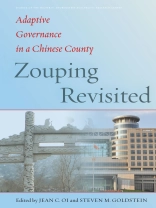China has undergone dramatic change in its economic institutions in recent years, but surprisingly little change politically. Somehow, the political institutions seem capable of governing a vastly more complex market economy and a rapidly changing labor force. One possible explanation, examined in Zouping Revisited, is that within the old organizational molds there have been subtle but profound changes to the ways these governing bodies actually work. The authors take as a case study the local government of Zouping County and find that it has been able to evolve significantly through ad hoc bureaucratic adaptations and accommodations that drastically change the operation of government institutions.
Zouping has long served as a window into local-level Chinese politics, economy, and culture. In this volume, top scholars analyze the most important changes in the county over the last two decades. The picture that emerges is one of institutional agility and creativity as a new form of resilience within an authoritarian regime.
表中的内容
1. Change Within Continuity: Zouping County Government
2. Zouping in Historical Perspective
3. Creativity and Flexibility in County and Township Economic Governance
4. Directed Improvisation in Administrative Financing
5. The Evolution and Adaption of Business-Government Relations in Zouping
6. Non-Judicial Interpreters of ‘Legality’ and the Development of Law in the Local State
7. The Role of the Organization Department in Political Selection
8. Reforming and Updating Cadre Training in Zouping’s Communist Party Schools
9. Institutional Agility and Regime Adaptation
关于作者
Jean C. Oi is William Haas Professor in Chinese Politics and a Senior Fellow at the Freeman Spogli Institute for International Studies at Stanford University.
Steven Goldstein is Sophia Smith Professor Emeritus of Government at Smith College, Director of the Taiwan Studies Workshop, and Associate at the Fairbank Center at Harvard University.












